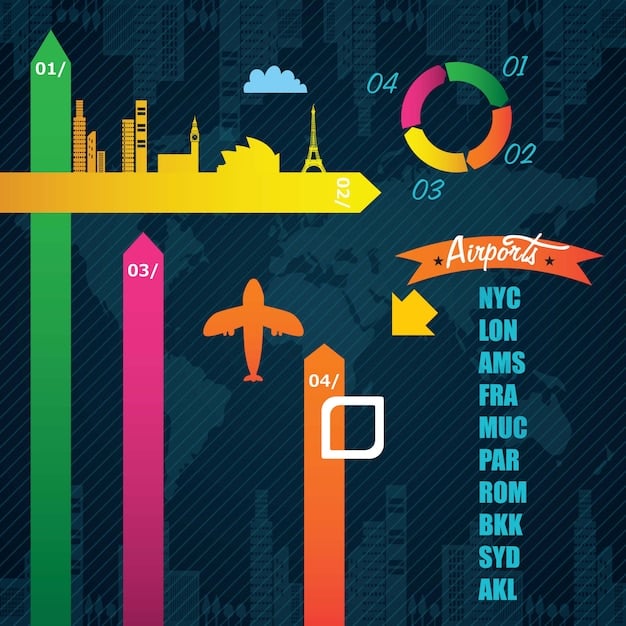US Smart City Tech: Top Funded Projects in 2025

US Smart City Tech projects are receiving significant funding in 2025, focusing on initiatives like sustainable infrastructure, advanced transportation systems, and enhanced data-driven governance to improve the quality of life for urban residents.
As cities across the US strive for innovation and sustainability, the landscape of **US Smart City Tech: Which Projects Are Receiving the Most Funding in 2025?** is rapidly evolving. This article delves into the leading projects and initiatives securing the most investment, aiming to transform urban living through technology.
Understanding the Smart City Concept in the US
The smart city concept is gaining traction across the United States, driven by the potential to enhance urban life. But what exactly constitutes a smart city in the US context? It’s more than just implementing technology; it’s about creating interconnected, data-driven ecosystems that address urban challenges and improve the quality of life for residents.
Key Components of US Smart Cities
Several components are essential to the development of smart cities in the US, each contributing to a more efficient and sustainable urban environment.
- Smart Infrastructure: This includes advanced transportation systems, smart grids, and intelligent building management systems that optimize resource utilization and reduce environmental impact.
- Data-Driven Governance: Utilizing real-time data analytics to make informed decisions, improve public services, and enhance citizen engagement in city management.
- Sustainable Solutions: Focusing on renewable energy sources, waste reduction programs, and green infrastructure to create environmentally friendly urban spaces.
The Role of Technology in Urban Transformation
Technology serves as the backbone of smart city initiatives, enabling data collection, analysis, and communication across various urban systems. This interconnectedness leads to more responsive and efficient city services.

In conclusion, the smart city concept in the US is about leveraging technology to create more sustainable, efficient, and livable urban environments. Key components include smart infrastructure, data-driven governance, and sustainable solutions, all working together to transform urban life.
Top Smart City Projects Receiving Funding in 2025
Several US smart city projects are at the forefront of innovation, attracting significant funding due to their potential to revolutionize urban living. These projects span various sectors, from transportation to energy, and are designed to address specific challenges faced by cities across the country.
Smart Transportation Initiatives
One of the primary areas of focus for smart city projects is transportation, with initiatives aimed at reducing congestion, improving safety, and promoting sustainable mobility.
- Autonomous Vehicles: Cities are investing in pilot programs to test and deploy autonomous vehicles, aiming to reduce traffic accidents and improve transportation efficiency.
- Smart Traffic Management Systems: These systems use real-time data to optimize traffic flow, reduce bottlenecks, and improve overall transportation network performance.
- Electric Vehicle Infrastructure: Expanding the charging infrastructure for electric vehicles to encourage adoption and reduce greenhouse gas emissions.
Sustainable Energy Solutions
Another critical area of investment is sustainable energy, with projects focused on reducing reliance on fossil fuels and promoting renewable energy sources.
These projects represent some of the top smart city initiatives receiving funding in 2025, each contributing to a more sustainable, efficient, and livable urban environment. The focus on transportation, energy, and data-driven infrastructure is driving innovation and transforming cities across the US.
The Role of Government Funding and Private Investment
The development of smart cities in the US is fueled by a combination of government funding and private investment, each playing a crucial role in advancing these innovative projects. Understanding the sources and allocation of funding is essential to grasping the momentum behind smart city initiatives.
Federal and State Government Initiatives
Government funding at both the federal and state levels provides crucial support for smart city projects, often through grants, tax incentives, and pilot programs.
- Infrastructure Grants: Federal grants are available for infrastructure projects, including transportation, energy, and water systems, which are often integral to smart city initiatives.
- Research and Development Funding: Government agencies invest in research and development to advance smart city technologies and solutions, fostering innovation and collaboration.
- Public-Private Partnerships: Governments are increasingly partnering with private companies to leverage their expertise and resources in developing smart city projects.

The combination of government support and private investment is driving the growth of smart cities in the US, enabling innovative projects that address urban challenges and improve the quality of life for residents. The collaborative approach between public and private sectors is key to achieving sustainable and scalable smart city solutions.
Challenges and Opportunities in Smart City Development
The development of smart cities in the US presents both challenges and opportunities. While technology offers immense potential for urban transformation, various hurdles must be addressed to ensure successful implementation and widespread adoption.
Addressing Privacy and Security Concerns
One of the primary challenges is addressing privacy and security concerns related to the collection and use of citizen data in smart city systems.
Ensuring Equitable Access and Inclusivity
Another challenge is ensuring equitable access to smart city technologies and services for all residents, regardless of income, location, or background.
Addressing these challenges and leveraging the opportunities requires a collaborative approach involving government, industry, and citizens. By prioritizing privacy, security, and inclusivity, smart cities can realize their full potential to create sustainable, equitable, and livable urban environments for all.
The Impact of Smart City Tech on Urban Life
The integration of smart city technologies is having a profound impact on urban life in the US, transforming various aspects of how people live, work, and interact within cities.
Improved Quality of Life for Residents
One of the most significant impacts of smart city tech is the improved quality of life for residents, through enhanced services, convenient access to information, and safer urban environments.
Enhanced Sustainability and Resilience
Smart city technologies are also contributing to enhanced sustainability and resilience, helping cities reduce their environmental impact and adapt to the challenges of climate change.
Overall, the impact of smart city tech on urban life is significant and far-reaching, transforming cities into more sustainable, efficient, and livable environments for residents. By leveraging technology to address urban challenges and improve the quality of life, smart cities are shaping the future of urban living in the US.
Future Trends in US Smart City Tech Funding
As smart city development continues to evolve in the US, several future trends are expected to shape the landscape of funding and investment in this sector. Understanding these trends is essential for stakeholders seeking to capitalize on the opportunities in the smart city market.
Increased Focus on Cybersecurity and Data Privacy
One of the key trends is an increased focus on cybersecurity and data privacy, driven by growing concerns about data breaches and privacy violations.
Growing Emphasis on Citizen Engagement and Participation
Another trend is the growing emphasis on citizen engagement and participation in smart city initiatives, recognizing the importance of involving residents in the planning and implementation of these projects.
These future trends highlight the evolving nature of smart city development in the US, with a growing emphasis on sustainability, equity, and resilience. By anticipating these trends and adapting their strategies accordingly, stakeholders can position themselves for success in the dynamic and rapidly growing smart city market.
| Key Aspect | Brief Description |
|---|---|
| 💡 Smart Infrastructure | Advanced transportation and energy systems improving resource use. |
| 📊 Data Governance | Using real-time data for better decision-making and public services. |
| 🌱 Sustainability | Renewable energy and waste reduction for eco-friendly cities. |
| 🔒 Cybersecurity | Protecting citizen data is vital for smart city trust and growth. |
Are Smart City Projects Just About Technology?
▼
A smart city in the US integrates technology to improve urban life through interconnected systems. It focuses on sustainability, efficiency, and citizen engagement. It’s about solving urban challenges, not just technology adoption.
▼
Transportation and energy sectors often receive the most funding. Smart transportation initiatives aim to reduce congestion. Sustainable energy projects focus on renewable sources and reducing reliance on fossil fuels for long-term gain.
▼
Governments provide funding through grants for infrastructure projects. They also support research and development. Public-private partnerships allow for shared expertise and resources, boosting growth of smart city strategies.
▼
Challenges primarily include addressing data privacy and security concerns. Ensuring equitable access for all, regardless of income or location, can be complicated. Balancing innovation with ethical considerations matters significantly.
▼
Future funding will likely prioritize cybersecurity and citizen engagement. Sustainable and resilient planning will be pivotal. Tech like AI and IoT could grow quickly. Public-private partnerships would boost development further.
Conclusion
In conclusion, US Smart City Tech projects are transforming urban landscapes by focusing on innovation and sustainability. With significant investments in areas like advanced transportation, data-driven infrastructure, and green energy, these projects aim to enhance the quality of life for urban residents and create more resilient and efficient cities. As funding continues to evolve, the emphasis on cybersecurity, citizen engagement, and sustainable practices will shape the future of smart city development in the US.





